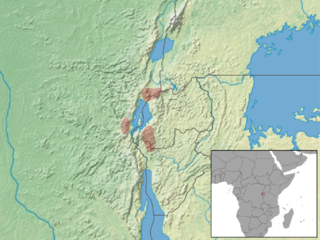
Neumann's grass rat is a species of rodent in the family Muridae. It is found in Ethiopia, Somalia, Sudan, Tanzania, and possibly Kenya. Its natural habitats are dry savanna and subtropical or tropical dry shrubland.
The fraternal hill rat is a species of rodent in the family Muridae. It is found only in northeastern Sulawesi, Indonesia. Its natural habitat is tropical dry forest. It is threatened by habitat loss.
The long-headed hill rat is a species of rodent in the family Muridae. It is found only in Sulawesi, Indonesia, where it is only known from Mount Tambusisi. Its natural habitat is subtropical or tropical dry forests. It is threatened by habitat loss.
The Celebes shrew-rat is a species of rodent in the family Muridae. It is found only in Sulawesi, Indonesia. Its natural habitat is subtropical or tropical dry forests. It is threatened by habitat loss.

Delacour's marmoset rat, also known as the lesser marmoset rat, is an arboreal species of rodent in the family Muridae. It is found in China, Laos, and Vietnam. Its natural habitat is montane subtropical or tropical dry forest at elevations from 1200 to 1500 m. It is threatened by habitat loss.

Hapalomys is a genus of rodent in the family Muridae endemic to Southeast Asia. It is the only member of the tribe Hapalomyini. It contains the following species:
The Komodo rat or Nusa Tenggara Komodomys, is a species of rodent in the family Muridae found only in the Lesser Sunda Islands of Indonesia, in Rintja, Padar, Lomblen, and Pantar islands. Its natural habitat is subtropical or tropical dry forests. It is threatened by habitat loss.

The long-footed water rat is a species of rodent in the family Muridae. It is found in the mountains of southern Papua New Guinea. Its natural habitat is subtropical or tropical dry forest.

The Fly River water rat is a species of rodent in the family Muridae. It is found only in Papua New Guinea. Its natural habitat is subtropical or tropical dry forests. It is threatened by habitat loss.
The black-clawed brush-furred rat is a species of rodent in the family Muridae. It is found only in Ethiopia. Its natural habitat is subtropical or tropical high-altitude grassland. It is threatened by habitat loss.
Rahm's brush-furred rat is a species of rodent in the family Muridae. It is found in Democratic Republic of the Congo, Rwanda, and Uganda. Its natural habitat is subtropical or tropical moist montane forests. It is threatened by habitat loss.
The Kondana soft-furred rat, also known as the Kondana rat or large metad, is an endangered species of rodent in the family Muridae. It is a nocturnal burrowing rat that is endemic to the Sinhgad plateau near Pune, Maharashtra, India. Its natural habitats are subtropical or tropical dry forests, subtropical or tropical dry lowland grassland, and urban areas. Major threats are habitat loss, overgrazing of vegetation, and disturbance from tourism and recreational activities.
The Ghana rufous-nosed rat, also known as the West African Oenomys, is a species of rodent in the family Muridae. It is found in Ivory Coast, Ghana, Guinea, Liberia, and Sierra Leone. Its natural habitats are subtropical or tropical seasonally wet or flooded lowland grassland and seasonally flooded agricultural land, it has also been observed in secondary high forest habitat.
Oligoryzomys magellanicus, also known as the Patagonian colilargo and the Magellanic pygmy rice rat, is a species of rodent in the genus Oligoryzomys of the family Cricetidae. It is found in the southernmost parts of Argentina and Chile, including Tierra del Fuego and other outlying islands. Its karyotype has 2n = 54 and FNa = 66.
Nephelomys keaysi, also known as Keays's oryzomys or Keays's rice rat, is a species of rodent in the genus Nephelomys of family Cricetidae. It is found from southeastern Peru to northern Bolivia on the eastern slope of the Andes in Yungas humid forest at altitudes of 1000 to 2600 m. Although its continued existence is not in serious danger and it is listed as "least concern", destruction of its habitat may pose a threat to some populations.
Issel's groove-toothed swamp rat is a species of rodent in the family Muridae. It is found only in Uganda. Its natural habitats are arable land and rural gardens. It is threatened by habitat loss.
Verschuren's swamp rat is a species of rodent in the family Muridae. It is found only in Democratic Republic of the Congo. Its natural habitat is subtropical or tropical moist lowland forests. It is threatened by habitat loss.
The palm rat is a species of rodent in the family Muridae. It is found in the Nicobar Islands, on Car Nicobar and Great Nicobar islands.
The gray-tailed narrow-headed rat is a species of rodent in the family Muridae. It is found only in Ethiopia. Its natural habitats are subtropical or tropical moist montane forests, subtropical or tropical high-elevation shrubland, and subtropical or tropical high-elevation grassland. It is threatened by habitat loss.

Kemp's thicket rat is a species of rodent in the family Muridae. It is found in Burundi, Democratic Republic of the Congo, and Rwanda. Its natural habitat is subtropical or tropical moist montane forests. It is threatened by habitat loss.





